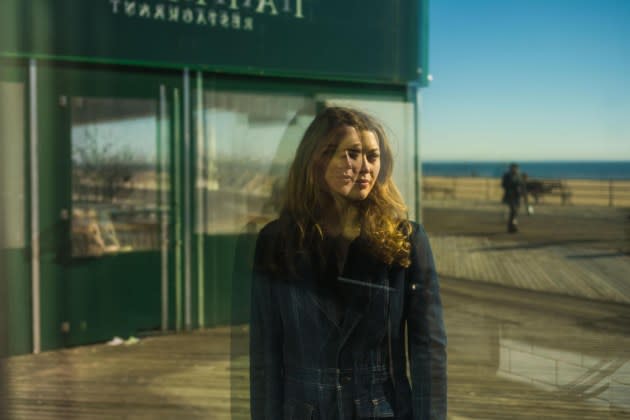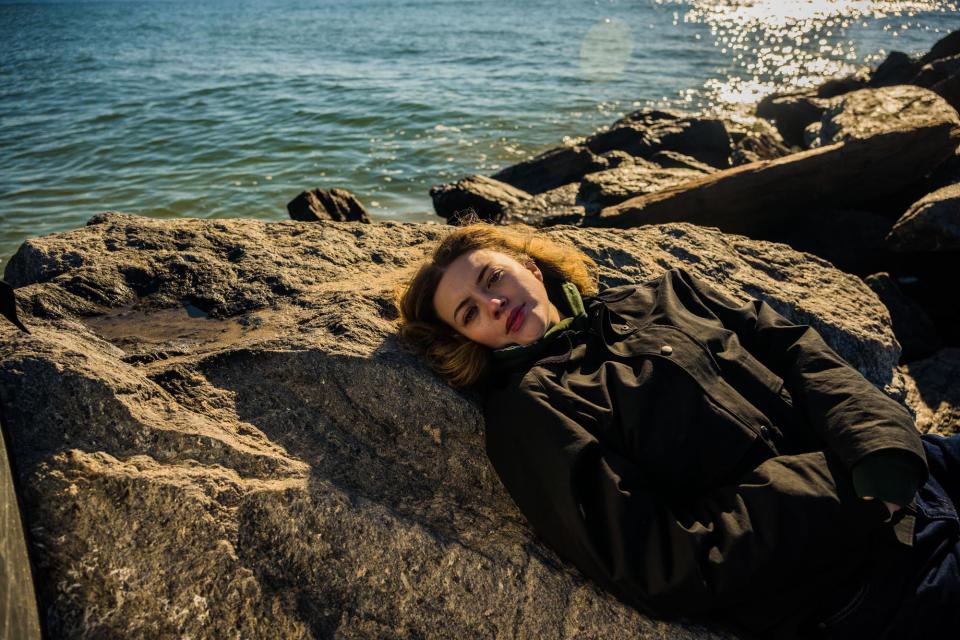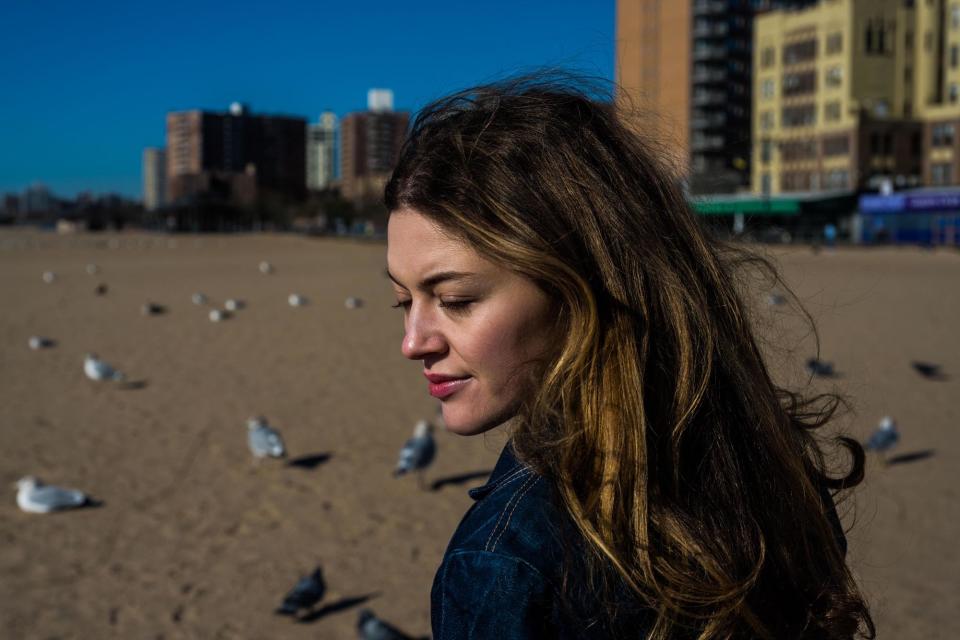Meet the Brooklyn Social Worker Who Made One of the Best Indie Albums of the Year
- Oops!Something went wrong.Please try again later.

When Anna Beckerman got the opportunity to go on her first-ever tour this past summer, she had to have an awkward conversation with her boss. “It was definitely weird,” Beckerman, a 29-year-old social worker at a Brooklyn preschool, recalls with a laugh. She reenacts the moment she revealed her side gig, staring bashfully at the ground: “I was like, ‘I make music…. You can look it up…. D-A-N-E…’”
That would be Daneshevskaya, the name she uses when she performs her tender, scintillating indie rock (and also her real-life middle name). It’s pronounced “Dawn-eh-shev-sky-uh,” though Beckerman admits even she pronounces it wrong. The name belonged to her Russian-Jewish great-grandmother, so it’s fitting that we’re meeting inside Varenichnaya, a quaint Russian restaurant in Brooklyn’s Brighton Beach.
More from Rolling Stone
Susan Sarandon Apologizes After Pro-Palestinian Rally Comments: 'Phrasing Was a Terrible Mistake'
Protester Sets Self on Fire Outside Israeli Consulate in Atlanta
It’s an evening in early November, and we’re the restaurant’s only guests. The room is warm and European, with tile floors, brick walls, and artificial grapes and greenery hanging in every direction. Beckerman didn’t grow up eating Russian food in her family household, but became a fan of it simply by living in New York City.
Beckerman takes the reins on placing the order: kompot juice, potato vareniki, boiled-meat vareniki, a salad, pumpkin samsa, and hot borscht. She’s a big fan of the beet soup: “I had a box of it once,” she says, her blue eyes lighting up. “I was putting it in cups and just drinking it like it was juice.”

On Nov. 8, Beckerman released Long Is the Tunnel, her second EP (following 2021’s excellent Bury Your Horses) that marks her first release on Winspear. Tunnel contains seven songs that feature Beckerman’s velvety vocals backed by instruments ranging from violin to saxophone, creating a cozy, surrealistic landscape of sound. This tends to stand in contrast with the lyrics, which can be raw and unflinching: “I never wanted to tell you that this was goodbye/Tell me one thing that you said to me that wasn’t a fucking lie,” she sings over twinkling keys on the album highlight “Bougainvillea.”
“I like how the anger and the pretty feelings and the sadness all sit within the same song,” Beckerman observes of the track, which she co-wrote with her friend Madeline Leshner back in 2017. Some songs have more sadness than others, like the gorgeous opener “Challenger Deep.” It’s a stripped-down track that features Beckerman over finger-picked guitar, with a chorus (“Will you wait for me/Where there is no later on”) that was based on a poem written by her late grandmother, Gloria. Later, Beckerman texts me a photo of the poem, titled “Loss”:
I am not sad nor angry,
just distraught
by space that does not fill.
It’s not even that you aren’t here
but that
there is no later.
“She was someone who called bullshit and was really independent and smart,” she says, quietly explaining that Gloria died of dementia during the pandemic. “To see that person be an infant version of themselves, it breaks your brain. Family goodbyes and breakups are definitely a theme in most of my songs.”
Another theme is water, prevalent in the submerged-sounding production of “Challenger Deep” and other tracks. “I definitely find water imagery to be a safe place to be inspired by,” she says. “I was one of those kids that would see how long they could stay on the bottom of the pool. I feel like it’s so easy to write corny lyrics about a lot of things, but I feel like water for some reason doesn’t end up getting corny. Everyone has a relationship to it, one way or another.”
Birds are also a frequent topic, from the fuzzy rocker “Big Bird” to the sweeping closer “Ice Pigeon” (“I know that you’re better than me/But can we still go for that walk?”). Her father used to collect bird figurines, and she has memories of her parents feeding a sick bird with a syringe when she was younger. Plus, she adds, “It’s a big part of wildlife that you see in New York City.”

BECKERMAN WAS BORN in San Francisco and moved to New York when she was seven. Her father is a music professor at NYU, while her mother studied opera. The first CD she ever bought was Hilary Duff’s Metamorphosis (“I remember opening it and being like, ‘This is the most beautiful thing’”) but she credits her two older brothers with introducing her to indie albums like Rilo Kiley’s The Execution of All Things and Neutral Milk Hotel’s In the Aeroplane Over the Sea.
Beckerman attended NYU, interning at several music labels — 300 Entertainment, Mom + Pop, ATO, and Domino — before deciding to go to Hunter for a graduate degree in social work. Being a social worker by day and an indie-rock musician at night was never part of the plan.
“I’m so pleasantly surprised that I’m doing music,” she says. “I always knew music would be a part of my life, but I truly did not ever think I would be doing this right now. It’s always a very surreal thing that I’m constantly reminding myself like ‘No, this is wild. This wasn’t supposed to happen. You’re very lucky.’”
Tunnel was produced by Beckerman’s partner, Artur Szerejko, as well as Hayden Ticehurst and Model/Actriz drummer Ruben Radlauer. “It has a lot of hands, a lot of chefs,” she notes. Lewis Evans from Black Country, New Road, the London band Beckerman opened for on her monthlong tour last September, plays saxophone on her album.
Because of her full-time career, she acknowledges her experience touring was different from most struggling musicians. “It was really fun, but the whole time, I was struck by how different it would be if I needed to make a profit,” she says. “That would’ve been such a different experience than the one I was having, and I really loved the one I was having.”
She adds: “It’s something that I get to approach as a bonus part of my life, and I get to be wondrous and [not] care what people think of it, because I don’t need to survive on it. There is that comfort in knowing that even if I put out the worst album in the entire world, I would still go to work the next day and be valued and have a lot of hope in that part of my life.”
She laughs, recalling the moment she revealed her music career to her job. “My boss was like, ‘I listened to the band you’re opening for. It sounds very Mumford and Sons,’” she says. “I was like, ‘I will never tell that to Black Country, New Road!’”
Best of Rolling Stone

